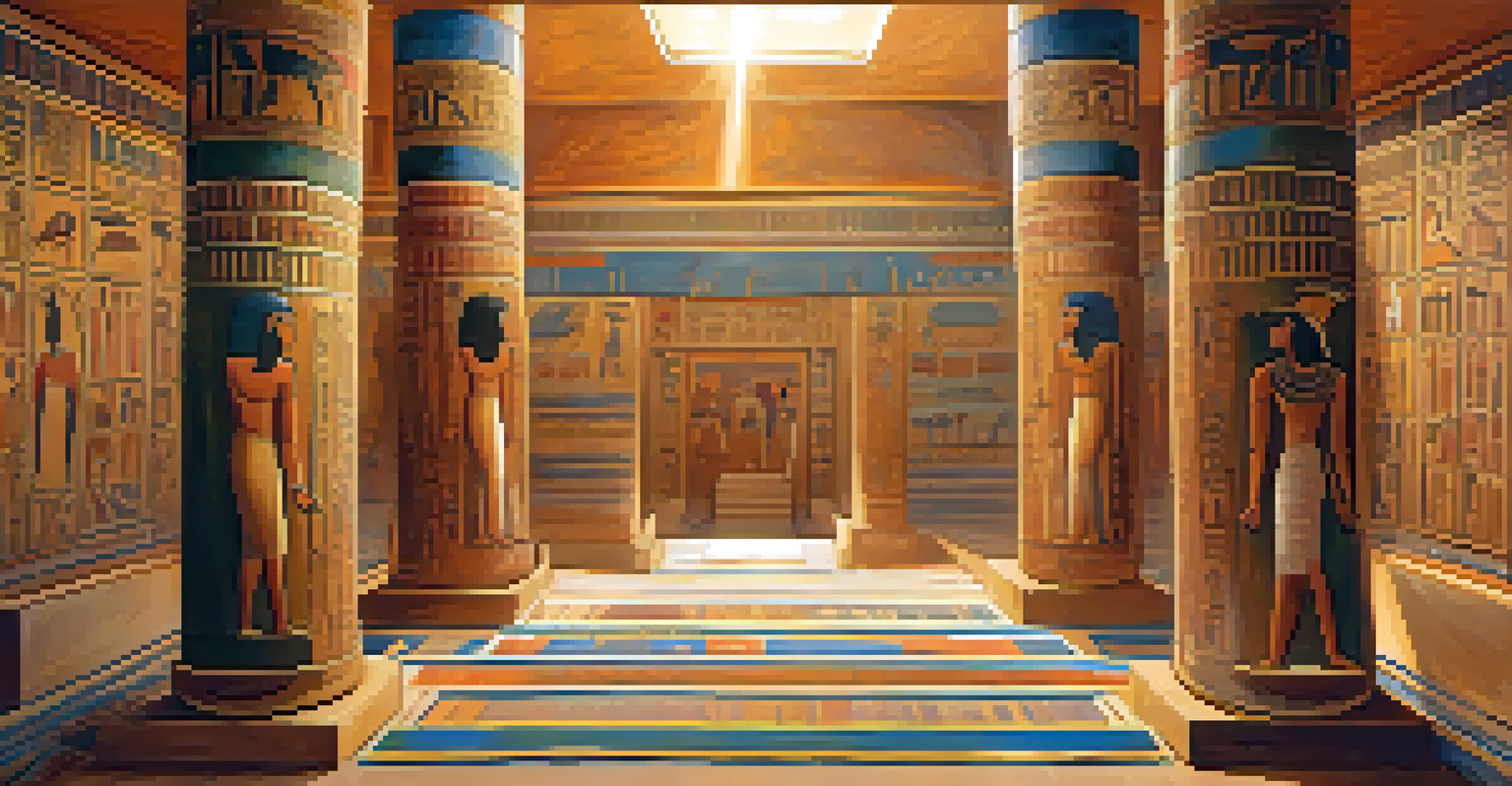Exploring the Concept of the Soul in Various Cultures

Understanding the Soul: A Universal Concept
The idea of the soul is a common thread woven through human history, transcending geographical and cultural boundaries. Many cultures view the soul as the essence of a person, representing their true self and consciousness. This universal concept often sparks curiosity about what it truly means to be alive and connected to something greater than ourselves.
The soul is the seat of the human consciousness and the source of all its powers.
For instance, in many Indigenous cultures, the soul is seen as interconnected with nature, emphasizing a relationship with the environment and all living beings. This belief reflects a holistic view of life, where the soul is not just an individual entity but part of a larger ecosystem. Such perspectives invite us to consider how our lives are intertwined with the world around us.
Ultimately, the exploration of the soul encourages deeper reflection on our existence. By examining different cultural interpretations, we can better appreciate the diverse ways people find meaning and purpose in their lives. This understanding allows for a richer dialogue about spirituality and our shared humanity.
Ancient Egyptian Beliefs: The Soul's Journey
In Ancient Egypt, the soul was believed to consist of several components, including the ka, ba, and akh. Each part played a unique role in the individual's existence and afterlife, emphasizing their complex understanding of the soul. The ka was seen as a life force, while the ba represented personality and could travel between the living and the dead.

The journey of the soul after death was particularly significant in Ancient Egyptian culture. They believed that the soul would undergo a judgment process, where the heart would be weighed against the feather of Ma'at, the goddess of truth. A balanced outcome meant a peaceful afterlife, while an unbalanced result led to a more ominous fate.
Cultural Views on the Soul
Various cultures interpret the soul differently, influencing beliefs about life, death, and our connection to the universe.
These beliefs not only influenced their burial practices but also their art and architecture, reflecting a profound reverence for the soul's journey. The elaborate tombs and mummification processes highlight their commitment to ensuring a successful passage into the afterlife. This cultural emphasis on the soul's journey invites us to reflect on how we honor our legacies.
Hinduism: The Soul and Reincarnation
In Hinduism, the concept of the soul, or atman, is central to understanding life and the universe. Hindus believe that the atman is eternal and undergoes a cycle of birth, death, and rebirth, known as samsara. This journey continues until the soul reaches enlightenment and reunites with Brahman, the ultimate reality.
We are not human beings having a spiritual experience; we are spiritual beings having a human experience.
The idea of karma plays a critical role in this process, as actions in one life influence the circumstances of future lives. This belief instills a sense of responsibility and moral integrity, encouraging individuals to act in ways that positively impact their soul's journey. It's a continuous cycle of growth and learning.
Hindu practices, such as meditation and yoga, are often aimed at realizing the true nature of the soul and breaking free from the cycle of reincarnation. This pursuit reflects a deep spiritual aspiration to understand one's place in the universe. Ultimately, the Hindu perspective on the soul invites us to consider the broader implications of our actions and existence.
Christianity: The Soul's Connection to God
In Christianity, the soul is viewed as a divine gift, connecting individuals to God. It is often seen as the immortal part of human beings that carries their essence beyond physical life. This belief emphasizes the importance of nurturing one's soul through faith, love, and moral living.
Christian teachings often highlight the idea of salvation, where the soul is redeemed through faith in Jesus Christ. This path leads to eternal life, a concept that resonates deeply with many believers. The soul's journey towards salvation reflects a longing for connection and purpose.
The Soul's Journey in Beliefs
Different religions present unique narratives about the soul's journey, from reincarnation in Hinduism to salvation in Christianity.
Moreover, the emphasis on the soul has influenced countless art and literature throughout Christian history. From paintings to hymns, the portrayal of the soul's divine connection is a recurring theme. This cultural legacy invites us to reflect on our own spiritual beliefs and the ways they shape our understanding of life and death.
Buddhism: The Illusion of the Soul
Buddhism presents a unique perspective on the concept of the soul, often challenging traditional notions of a permanent self. Instead of a soul, Buddhists believe in the concept of anatta, or 'non-self,' which posits that what we consider the self is merely a collection of changing experiences and perceptions. This understanding encourages a sense of detachment and acceptance of impermanence.
The cycle of rebirth, or samsara, influences how Buddhists view existence. They believe that through mindfulness and ethical living, one can attain enlightenment, ultimately breaking free from the cycle of suffering. This journey is more about overcoming attachments than preserving a soul, reshaping the narrative around identity.
Buddhism's approach invites individuals to explore the nature of existence and the self, fostering a deeper understanding of their experiences. By recognizing the illusion of a permanent soul, practitioners can cultivate compassion and wisdom. This perspective encourages us to ponder our own identities and how we relate to the world.
Indigenous Cultures: The Soul and Nature
Many Indigenous cultures hold a profound belief in the connection between the soul and the natural world. The notion that all living beings possess a spirit or soul fosters a deep respect for nature and the environment. This relationship emphasizes the idea that human beings are just one part of a larger, interconnected web of life.
For example, Native American beliefs often include the idea of a 'Great Spirit' that encompasses all creation. This understanding encourages a harmonious relationship with nature, where the soul is seen as part of the earth's lifeblood. Such perspectives remind us of our responsibilities to care for the environment.
Modern Spirituality and the Soul
In contemporary society, the concept of the soul is evolving, focusing on personal experiences and self-discovery through practices like mindfulness.
The rituals and practices of Indigenous cultures often reflect this connection, incorporating elements like storytelling and ceremonies that honor the natural world. By engaging with these traditions, we can gain insights into how diverse cultures perceive the soul and its role in our lives. This approach invites us to consider how we can live more sustainably and respectfully.
Modern Perspectives: The Soul in Contemporary Society
In today's fast-paced world, the concept of the soul continues to evolve, often intersecting with science and psychology. Many people seek to understand the soul through personal experiences and spiritual practices, rather than strictly religious frameworks. This shift highlights a growing interest in individual spirituality and self-discovery.
The rise of mindfulness and wellness movements has rejuvenated discussions about the soul, encouraging individuals to reconnect with their inner selves. Practices like meditation, yoga, and holistic healing draw on ancient traditions, helping people explore their spiritual dimensions. This modern approach emphasizes self-awareness and personal growth.

Ultimately, contemporary perspectives invite us to reflect on what the soul means in our lives. As we navigate a complex world, the quest for understanding our essence remains relevant. This ongoing exploration encourages dialogue about spirituality, identity, and our connections to others and the universe.